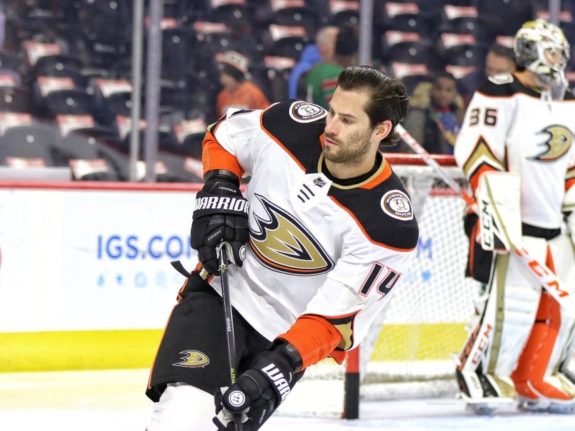The early-season blues continued Sunday (Dec. 10) for the Anaheim Ducks, who fell to the Winnipeg Jets in the final stages of regulation. It was yet another close, winnable game that got away from them because of a few simple mistakes. These types of losses are perpetuating a stretch of results that are excruciating and currently offering little reason for optimism.
Related: Ducks Gameday Preview: Winnipeg Jets – 12/10/23
With 11 losses in their last 12 games, the Ducks ended the week with losses to the Chicago Blackhawks (Dec. 7) and the Jets. Let’s look at some positive and negative takeaways from the defeat as they get ready for a tough week ahead against some Eastern Conference foes.
Positive: Ducks Got Offense From Unlikely Sources
It’s probably time to start worrying about Troy Terry, who still hasn’t scored since his hat trick against the Arizona Coyotes on Nov. 1. He still sits with five goals through 27 games. But he did contribute last night with a primary assist on Alex Killorn’s power play goal. It was his sixth point in 17 games since the Coyotes contest when he had four (three goals, one assist) of his 15 total points this campaign.
Max Jones avoided a serious injury and returned to action against the Jets. He collected the secondary assist that began Killorn’s scoring sequence. His play of late has earned him some time on special teams, and it paid off last night. He was scrappy, moved the puck well, and it was nice to see him get rewarded for it.
Jakob Silfverberg and Adam Henrique, two underperforming players, connected on the second goal. It hasn’t been a successful start (by any definition) to the season by either player. Their inconsistent play has them cemented as bottom-six forwards, even with all of the injury woes. That said, Silfverberg made a great pass to an in-stride Henrique, who beat Connor Hellebuyck with a perfect shot.

I say unlikely because the fact is that these players have not consistently driven or supplemented the offense this season. This applies mostly to Terry and Henrique, who have both been two of the most reliable Ducks forwards in recent years. Will it be a while before we see them on the scoresheet again? Hopefully not.
Negative: Lack of Defensive Fundamentals Doomed the Ducks
The Ducks hadn’t lost this season when leading entering the third period. They added a second goal two minutes in the third in this one to go up 2-0. It should’ve been enough, but it wasn’t.
Why? Because the Ducks were sloppy defensively on a series of plays that resulted in goals. The Jets got on the board because Nino Niederreiter skated through three Ducks unchecked to make himself available for a centering pass. He should’ve never been allowed to get superior positioning so easily. By the time Urho Vaakanainen went to stick-check him, it was too late.
The second goal was tough. Ducks defenders couldn’t locate the loose puck fast enough after a blocked shot, and Morgan Barron got to it first. There was nothing wrong with this play per se, but Barron scored because he also went unchecked as he crashed the net in search of the puck. This happens sometimes. When you try to locate the puck, you lose sight of players. And when the puck sits in front of the net for too long, bad things tend to happen. The fact that this tying marker came immediately after the first goal was the worst-case scenario.
The game-winner by the Jets was the most disappointing. Gabriel Vilardi scored a one-handed deflection with about two minutes remaining. He was only able to reach out and make contact on the long-range shot because his stick was not tied up by Vaakanainen, who was instead tying up the body. Finding and controlling sticks, especially on shots from the points or sideboards, is imperative. Not doing so is how seemingly innocuous shots become dangerous scoring opportunities. That’s what we saw on the Jets’ game-winner, unfortunately.
Positive: Special Teams Stood Out
Once again, the Ducks shut their opposition out on the penalty kill. On the season, their penalty kill percentage is around 80 percent, which is middle of the pack, but they are not losing games because of their inability to kill penalties. They are still taking penalties, though, and remain the highest-penalized team in the NHL by a country mile.
John Gibson and the shorthanded units in front of him killed off a huge five-minute power play in the second period, but were unable to generate any goals from the momentum. As long as discipline remains an issue, the Ducks will play too much time shorthanded.
Ducks Face a Tough Road Trip Ahead Out East
The week ahead presents a number of challenges. They will play four games in six nights. Three of those games are against teams currently in playoff positioning. The marquee game of their road trip is a matchup with the Eastern Conference-leading New York Rangers (Dec. 15).
Right now, the Ducks have a simple directive. Just move forward and play. It’s not a question of if, but when, they will break out of this current funk. So, if they stay the course, get their guys healthy, and focus on one game at a time, they’ll emerge on the other side of this eventually.
What did you think of the Ducks’ performance? Sound off in the comments below.
